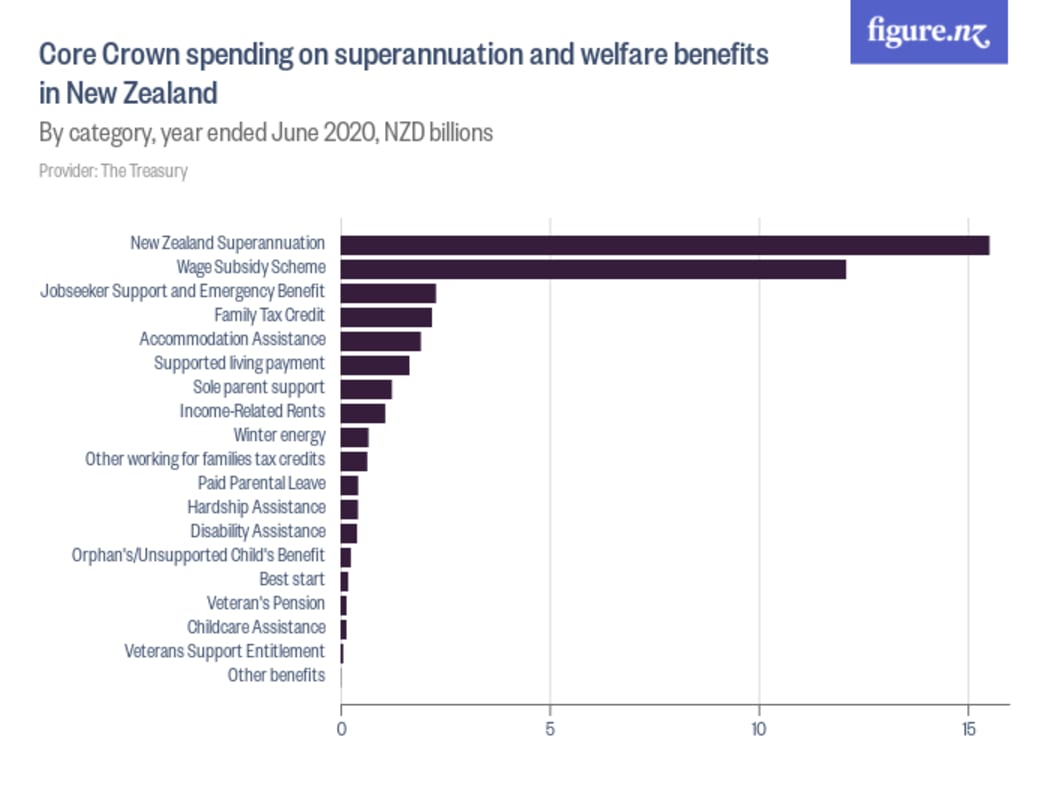The number of people 65 years and older getting superannuation payments while receiving income of more than $200,000 has more than tripled over the past decade.

Photo: 123RF
Superannuitants are the largest group of beneficiaries in New Zealand, and as the annual Super bill rises, so too do the number of high-earning recipients.
Inland Revenue figures released to Checkpoint show in 2009/2010 there were 2209 people who were on incomes of more than $200,000 a year receiving super. In 2019/20 that number had jumped to 7860.
Retirement Commissioner Jane Wrightson said it is not a problem, and the success and ease of the current system is that it is universally applied.
"If people have got an awful lot of independent money, should they also be eligible for the Super? It's a good policy question," but Wrightson said the only answer is means testing, which has been roundly rejected by New Zealanders several times in the past.
"Is it a huge problem for the country? No. I can see it could raise equity issues, but there isn't an easy way to resolve it unless you penalise people for providing for their own retirement as well as expecting Super," she said.
But Wrightson said the success of the superannuation scheme could hold lessons for other parts of the welfare system.
"In effect, we don't have pension poverty in this country. We do have child poverty; we don't have pension poverty. Why don't we have pension poverty? Because we have a good retirement income system - a modest one, but a good one.
"And I think there could be lessons to be learned about how it's administered, whether the current systems for different types of welfare benefits have just become too cumbersome."

Core Crown spending on superannuation and welfare benefits in New Zealand, year ended June 2020. Photo: figure.nz
Public policy researcher and NZ Super report author Jenesa Jeram said the rising number of well-paid superannuitants is a strength of the system, because it does not disincentivise people to stay in work.
But she said there is generally an expectation that superannuation should provide a more comfortable level of living than that of beneficiaries, when really they should both be treated equally.
She believes there are small changes that can be made to lower the overall cost of superannuation - including raising the age of eligibility so it is more inline with older people's working patterns.
"At the moment, NZ Super is indexed to both wages and inflation - in the future, governments may want to consider only indexing NZ Super to inflation, just because it does contain the costs and it leaves more money to go around for other needy groups," she said.
But raising the superannuation age poses major problems for some groups - only 5.6 percent of NZ Super recipients are Māori and 2.6 percent are Pasifika.
Jane Wrightson said there tends to be one group which does particularly well out of Super.
"When you look at women and Māori and Pasifika, all of whom arrive at pension age materially worse-off, generally speaking, than others, then the observations that say 'we need to put the age up' are put back into sharp relief.
"In effect, older Pākehā men do best out of this system," she said.
Economist and co-director of Massey University's Māori business unit Te Au Rangahau Dr Matthew Roskruge said while every effort should be made to pay everyone the pension they were told they would receive, that came at costs elsewhere.
"That comes at a trade-off, from being able to give free kai in schools, being able to give, being able to build or give people access to housing, education, health.
"Maybe superannuitants on high incomes need to be on increased taxes, [or] some other way of reducing that burden so we can reallocate the funds to where they're needed more," he said.
Inequality researcher Max Rashbrooke said fairness was at the heart of how superannuation worked, in contrast to other parts of the welfare system.
Pensioners get this benefit from the government, universally and without any questions asked, whereas beneficiaries are made to jump through the most appalling range of hoops, face incredibly intrusive or stigmatising questions, and generally are treated poorly by the system, he said.
"I would like us to take this data as an opportunity to think not about how we could treat pensioners worse, but about how we could treat other beneficiaries better."


